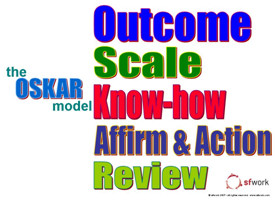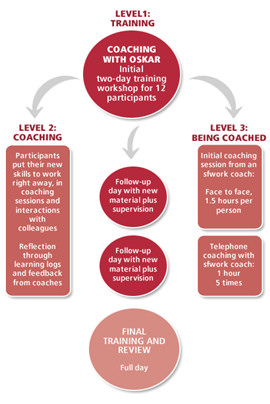

By Mark McKergow & Antoinette Oglethorpe, sfwork, and Justine Faulkner, Avon & Wiltshire Mental Health Partnership NHS Trust
Can a single coaching initiative lead to shifts in management thinking, enhanced leadership capability and a reassessment of customer-facing practices? Yes - with modest support and an emergent approach, as this case from the NHS shows.
Avon and Wiltshire Mental Health Partnership NHS Trust (AWP) is one of the UK's largest and most widely spread mental health providers. With well over 4000 staff, 16 inpatient sites and over 100 community based sites, the Trust has more than its share of management challenges.
In 2008 AWP were looking for a way to develop more of a coaching culture among senior and middle managers. They liked the look of the solution-focused approach, with its roots in clinical practice - because of the positive and pragmatic features of this model and because many clinical managers were already familiar in some way with the approach.
The Solution-Focused (SF) model of coaching starts with a startling assumption: the change you wish to see is starting to happen already - in some way, shape or form. The question is to establish what this useful change might look like and find elements and traces of it working within the organisation. These can then be built on quickly and effectively with small steps.
Probably the best-known SF coaching model is OSKAR, devised by Mark McKergow and Paul Z Jackson in their book The Solutions Focus. OSKAR stands for
Outcome - what difference will success make to everyday experience? |  |
Although coaching models like this are often taught as a process or a set of questions, we have found great power in helping managers think of each element as a separate tool. Our experience is that this is liberating and empowering for managers:
The original initiative involved three levels of learning for participants:
|  |
At the start of 2012, eleven cohorts of managers have taken the programme. Follow-up work published in the NHS journal showed that managers reported 'spending less time on problems' and on "why it's not fair", a decrease in anxiety and an increase in ability and action. They also noticed a ripple effect with colleagues. Difficult conversations were now progressed rather than left to fester.
Managers also found that they started to use the skills on themselves in a form of self coaching so that they too were able to find their own way past problems with positive results. All of these things helped increase their confidence, and helped them feel more in control. As more and more managers have been through the programme they have seen the positive effects rippling through the organisation:
As more and more people enjoyed the programme, opportunities started to appear for AWP to use the new developments in different ways. These started with a coaching network for participants, with people supporting each other and meeting from time to time for mutual learning and encouragement. This has been particularly welcome during the tough financial constraints of recent times.
As this network grew, AWP took the opportunity to connect the increasing level of coaching and SF skills with different 'difficult' contexts. Workshops about negotiation, conflict management, and personal effectiveness/time management have been popular, with each one reinforcing the overall coaching messages.
Managers also used their skills in setting up 'target attainment' workshops to focus attention on areas where progress was not yet good enough, bringing the SF approach to bear on particularly stubborn areas. One division was losing £1m a year through under-performance and failure to hit pre-agreed targets. They set up a solution-focused workshop to address the issues, and within 8 weeks the key figures were 57% of the way to where they needed to be.
According to AWP's Justine Faulkner, "The SF approach is becoming the way we do things round here." With a community of SF-skilled leaders and managers, it was inevitable that this approach would begin to impact on the organisation's relationships with service users. This connects with the growing movement towards a 'recovery' approach, where each user is seen as having their own experience of recovery at their own pace.
Rather than determining routes for recovery, AWP is working towards a more collaborative relationship where users make their own decisions. This means using coaching ideas in working with users. The combination of acknowledgement, affirmation and progress of the SF approach combined with its proven effectiveness in the organisation makes this the number one choice. The project will be carefully researched and documented over the coming months.
 | Mark McKergow is director of the Centre for Solutions Focus at Work (sfwork) (www.sfwork.com) |
Antoinette Oglethorpe is a solution-focused coach, facilitator and trainer specialising in helping leaders develop their capability and manage their careers. |  |
 | Justine Faulkner is Clinical Director, Acute Adult Community Services at Avon & Wiltshire Mental Health Partnership NHS Trust (www.awp.nhs.uk) |
838 days ago
1125 days ago
1247 days ago